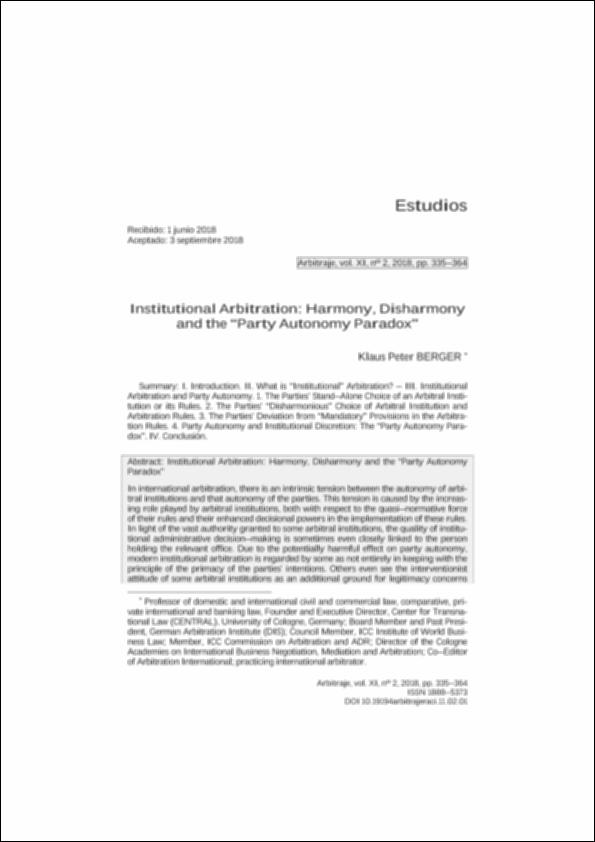Please use this identifier to cite or link to this item:
http://hdl.handle.net/10637/12438Institutional Arbitration : Harmony, Disharmony and the “Party Autonomy Paradox”.
| Title: | Institutional Arbitration : Harmony, Disharmony and the “Party Autonomy Paradox”. |
| Authors : | Berger, Klaus Peter |
| Keywords: | International arbitration.; Autonomy of the parties.; Arbitral institutions.; Arbitration rules.; Arbitraje institucional.; Autonomía de la voluntad de las partes.; Instituciones arbitrales.; Reglamentos de arbitraje. |
| Abstract: | In international arbitration, there is an intrinsic tension between the autonomy of arbitral
institutions and that autonomy of the parties. This tension is caused by the increasing
role played by arbitral institutions, both with respect to the quasi–normative force
of their rules and their enhanced decisional powers in the implementation of these rules.
In light of the vast authority granted to some arbitral institutions, the quality of institutional
administrative decision–making is sometimes even closely linked to the person
holding the relevant office. Due to the potentially harmful effect on party autonomy,
modern institutional arbitration is regarded by some as not entirely in keeping with the
principle of the primacy of the parties’ intentions. Others even see the interventionist
attitude of some arbitral institutions as an additional ground for legitimacy concerns which are being raised with respect to the international arbitral system as a whole.
Where the arbitration rules grant the institution discretion to decide matters concerning
the administration of the proceedings, party agreements should, as a rule, trump the
discretion of the institution. This approach serves to avoid potential damage to both the
attractiveness and the legitimacy of institutional arbitration inflicted by the party autonomy
paradox. En el arbitraje internacional, existe una tensión intrínseca entre la autonomía de las instituciones arbitrales y la autonomía de las partes. Esta tensión obedece al creciente papel desempeñado por las instituciones arbitrales, tanto con respecto a la fuerza cuasi–normativa de sus reglas, como en relación a sus poderes de decisión mejorados en la implementación de estas reglas. A la luz de la gran autoridad otorgada a algunas instituciones arbitrales, la calidad de la toma de decisiones administrativas institucionales a veces está estrechamente vinculada a la persona que ocupa el órgano competente. Debido al efecto potencialmente dañino sobre la autonomía de las partes, el arbitraje institucional moderno es considerado por algunos no del todo acorde con el principio de la primacía de las intenciones de las partes. Otros incluso ven la actitud intervencionista de algunas instituciones arbitrales como un elemento adicional para las preocupaciones de legitimidad que se plantean con respecto al sistema arbitral internacional en su conjunto. Cuando las reglas de arbitraje otorgan a la institución discreción para decidir sobre asuntos relacionados con la administración de los procedimientos, los acuerdos de las partes deben, por regla general, prevalecer sobre la discreción de la institución. Este enfoque sirve para evitar el daño potencial tanto al atractivo como a la legitimidad del arbitraje institucional infligido por la “paradoja de la autonomía de las partes”. |
| Description: | En: Arbitraje: revista de arbitraje comercial y de inversiones. eISSN. 2603-9281. vol. 11, n. 2, 2018, pp 335-364 |
| URI: | http://hdl.handle.net/10637/12438 |
| Rights : | http://creativecommons.org/licenses/by-nc-nd/4.0/deed.es |
| Issue Date: | 1-Sep-2018 |
| Appears in Collections: | 2018 Arbitraje nº 2 |
Items in DSpace are protected by copyright, with all rights reserved, unless otherwise indicated.


